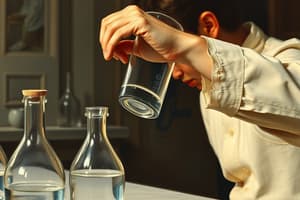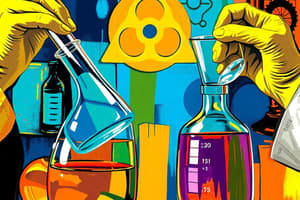Podcast
Questions and Answers
What is the correct method for handling a plug when disconnecting it from an electrical socket?
What is the correct method for handling a plug when disconnecting it from an electrical socket?
When transporting acids in a laboratory, what is the recommended practice?
When transporting acids in a laboratory, what is the recommended practice?
What should be done if you encounter chipped or cracked glassware?
What should be done if you encounter chipped or cracked glassware?
How should flammable hazardous liquids be handled?
How should flammable hazardous liquids be handled?
Signup and view all the answers
What should you use to fill a pipet instead of mouth suction?
What should you use to fill a pipet instead of mouth suction?
Signup and view all the answers
What is the proper way to clean up broken glass in the laboratory?
What is the proper way to clean up broken glass in the laboratory?
Signup and view all the answers
What is the correct order when diluting strong acids?
What is the correct order when diluting strong acids?
Signup and view all the answers
What should be done with damaged electrical equipment in a laboratory?
What should be done with damaged electrical equipment in a laboratory?
Signup and view all the answers
What is the recommended use of wash bottles in a laboratory setting?
What is the recommended use of wash bottles in a laboratory setting?
Signup and view all the answers
What should you do with chemicals after completing an experiment in the laboratory?
What should you do with chemicals after completing an experiment in the laboratory?
Signup and view all the answers
Study Notes
Laboratory Safety Guidelines
- Fill wash bottles exclusively with distilled water for rinsing glassware and equipment, or for adding water to containers.
- Always grasp the plug when removing an electrical device from its socket; ensure hands are dry before touching any electrical components.
- Inspect glassware prior to each use, avoiding any with chips, cracks, or dirt to prevent contamination or injury.
- Report any damaged electrical equipment, including frayed cords or exposed wires, immediately to ensure safety.
Pipetting and Chemical Handling
- Never use mouth suction to fill a pipet; instead, utilize a rubber bulb or pipet pump for safety.
- When transferring reagents, keep containers at a distance from your body to minimize exposure to spills.
- Handle acids with caution; always add acid to water, gently swirl the mixture, and be aware of heat production, especially with sulfuric acid.
- Perform all work with flammable liquids over a pan to catch spills; avoid using flammable liquids near open flames or heat sources.
Chemical Transport and Glassware Management
- Do not remove chemicals or materials from the laboratory area to maintain safety and compliance.
- Exercise caution when carrying acids or chemicals within the lab; hold them securely and navigate carefully.
- Carry glass tubing upright to reduce the risk of breakage and associated injuries.
- Use a brush and dustpan to handle broken glass; dispose of it in designated glass waste containers to prevent cuts or injuries.
Studying That Suits You
Use AI to generate personalized quizzes and flashcards to suit your learning preferences.
Description
Test your knowledge on essential laboratory safety procedures. This quiz covers important practices for handling glassware and electrical equipment to ensure a safe working environment. Review these critical guidelines and ensure you are prepared for safe lab operations.





